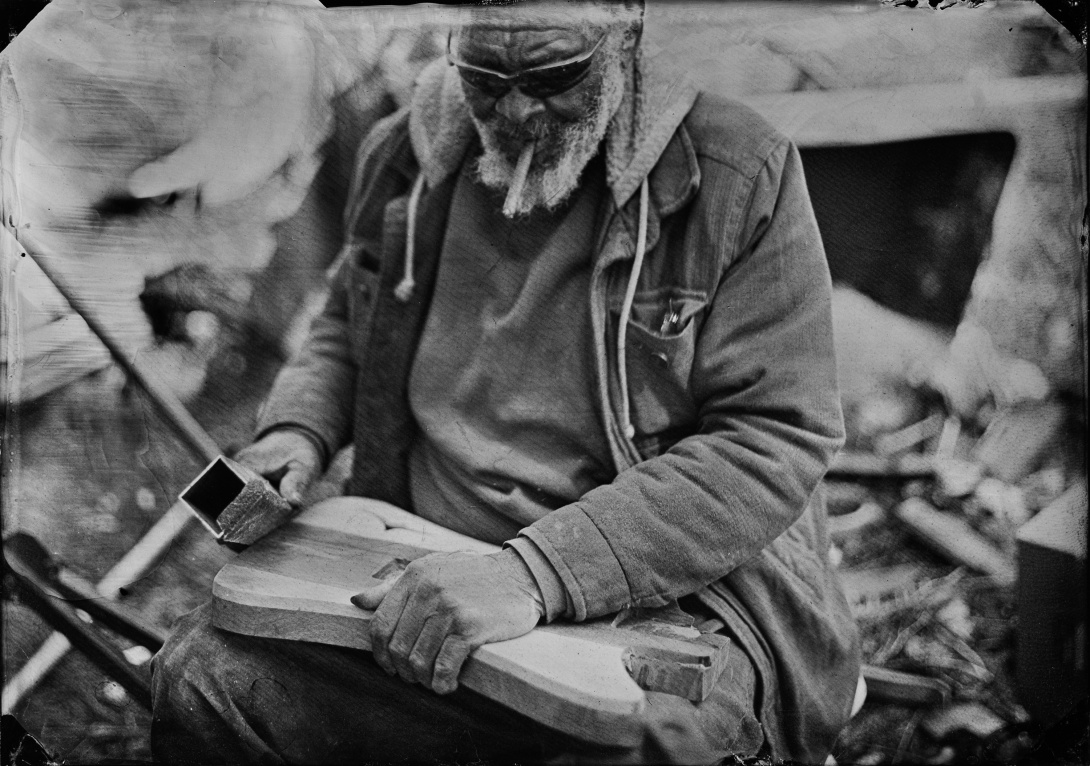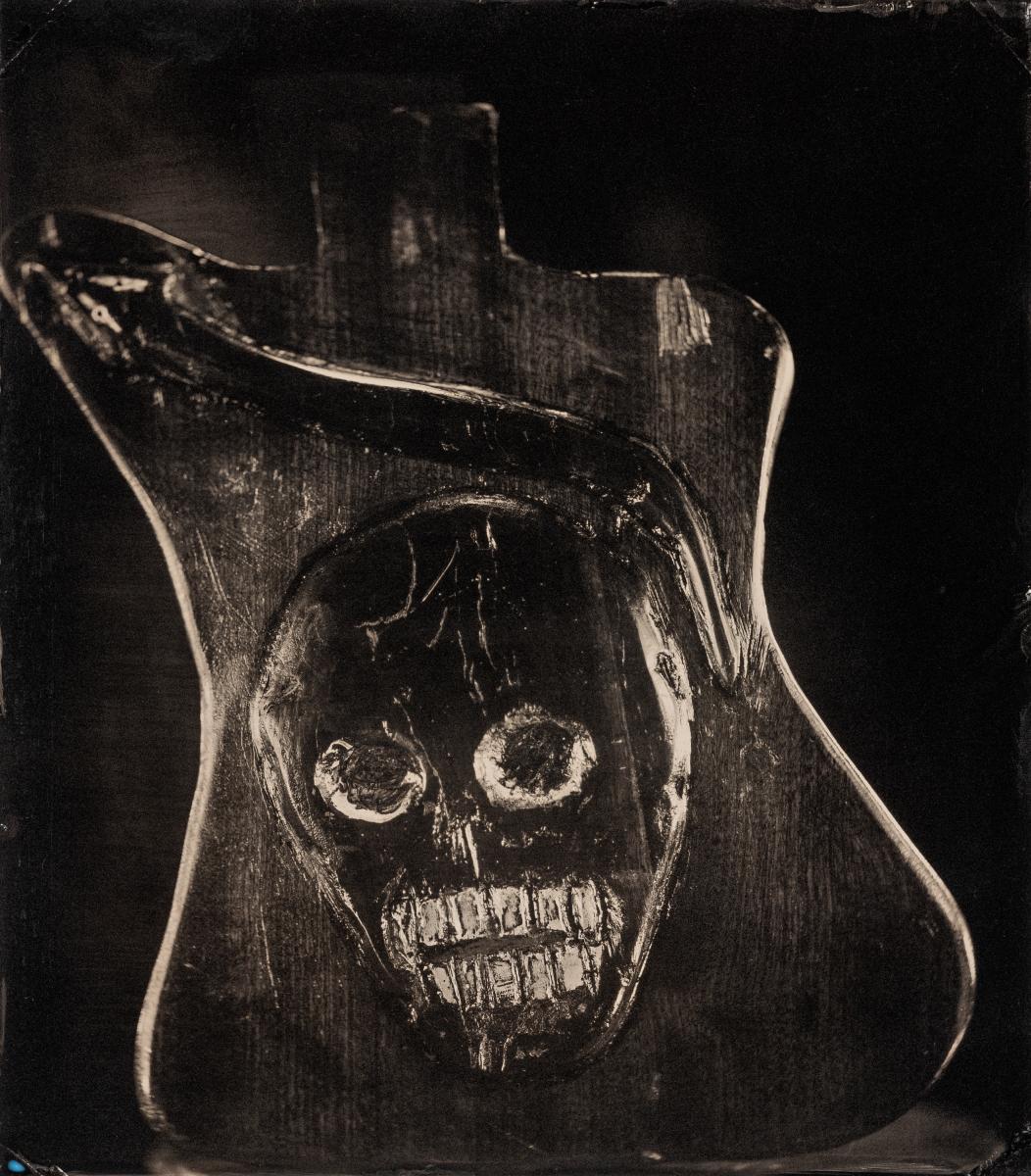A conversation with Freeman Vines, maker of hanging tree guitars

Freeman Vines working on a guitar. (Photo by Tim Duffy, used with permission)
Freeman Vines has been making guitars for decades.
"Back in the day, see, it were hard for a Black man to get an instrument any good so I was trying to make my own," he says during a Zoom call. "I went through that stage. Then the next stage I learned how to improve what I was doing, and after a while I got to the place that I know how to make one of those little cases."
Eventually, he moved to making solid-body guitars out of used wood. Over the years he's made countless guitars, as much pieces of art as they are musical instruments.
Vines is 78 years old now and lives in a house on the edge of Pitt County in Eastern North Carolina — in Fountain, population just over 400. He's just a few towns over from where he grew up during Jim Crow in Greene County, where his ancestors were enslaved and where his mother worked in a white family's house during his childhood. He's been all over the country in his nearly eight decades of life: He spent time in prison as a young man for selling moonshine and worked as a seasonal farmworker on what he calls the "tramp bus" that carted Black farmworkers around the country from harvest to harvest. But this is home.
"I can go out there and get my sleeping bag and sleep with the wild dogs. I can do anything I want to out there," he says. "It's a place where I can be free."
Vines' guitars have thrust him into the spotlight this year. In September, his book "Hanging Tree Guitars" was published by The Bitter Southerner and the Music Maker Relief Foundation. It's a collaboration with folklorist Zoe Van Buren and Tim Duffy, the director of the Music Maker Foundation in Hillsborough, North Carolina, a group that works with aging folk and blues artists throughout the South to preserve their music, connect them with social services, and book gigs for them.
The book is a mix of poetry, tin-type photography, and storytelling, chronicling the tale behind the collection of guitars Vines made out of wood from a hanging tree. The book recounts how Duffy, who is white, and Vines first met several years ago, before the hanging tree guitars came to be. In a series of written reflections and oral interviews, the two men recount their partnership — which led to Vines and Duffy learning the history of the hanging tree and the man who was lynched on it.
That man's name was Oliver Moore. In 1930, at the age of 29, he was arrested and accused of assaulting two white women. A mob of more than 200 white people took him from his jail cell, shot him, and hung him. It was front-page news at the time: The News & Observer of Raleigh published a photo of his body hanging from the tree. It's a incident of racial terrorism whose memory still reverberates.

"There's certain parts of Greene County you go in, and it's happiness and sunshine," Vines says in the book. "But when you get in there with them people about my age, it's totally different. They've been groomed just like me."
It was Duffy's whiteness that made Vines' white neighbors willing to open up about the details of the lynching. In 2018, a white woman brought Duffy to the lynching spot. "I think she just thought I was in with her because I was white," Duffy says in the book. "That hanging was a good thing to do, and that's why they did it, and she said 'I can't wait to show you the articles.'"
After Vines learned the details of the lynching from Duffy, the guitars he made out of the hanging tree incorporated snakes and skulls, elements of familiarity and death. The skull in one of those guitars, Vines says in the book, is Moore. The snake represents Vines himself.
On the Zoom call, Vines isn't interested in talking much more about the hanging tree guitars, or the man who was hanged.
"That's passed," he says. "The guitars are made and in museums."
The instruments have been displayed in the United Kingdom; now they're back in North Carolina, at the Greenville Museum of Art. While his guitars travel the world, Vines still lives in Fountain, alongside white neighbors who still support the racist power structures that shape the place's past and its present. Right now, he would rather talk about sound and history — about the wood he's working with, the new guitars he's made. "Got them laying everywhere," he says.
Recently he's been using wood from an old Steinway piano Duffy gave him, hard mahogany. There's also some sugar maple from Vermont, which has absorbed resin and syrup. "It'd take diamond blades to cut it," he says — but that won't stop him from working to shape it into a guitar. When Vines makes guitars, he lets the wood guide the sound. He doesn't fully know what a guitar will sound like until he plugs it in.
"Wood's got its own character. You've got to sit right there and learn what it is," he says.
This is also true of the guitar-building process. "The guitar determines its own sound. You'll be sitting there sawing, and when you get through sawing and everything, you don't know why you're making this circle and why you're zig-zagging here." When the guitar is played, the sound becomes clear.
Years ago, Vines heard a sound he's been chasing in his guitars ever since.
"Coming out of my shop one time, something happened. It may have been that some alien took me, stole my body momentarily," he says. "But the sound were me, I were the sound. At the end of the sound, when I started realizing what was going on and everything, I heard the most beautiful music you have ever heard in your life."
"And it worried me real bad for years. I started picking up wood again, making instruments trying to duplicate the sound, and just didn't ever find it," he continues. "Nobody else knew. I ain't never heard it no more."
Tags
Olivia Paschal
Olivia Paschal is the archives editor with Facing South and a Ph.D candidate in history at the University of Virginia. She was a staff reporter with Facing South for two years and spearheaded Poultry and Pandemic, Facing South's year-long investigation into conditions for Southern poultry workers during the COVID-19 pandemic. She also led the Institute's project to digitize the Southern Exposure archive.
